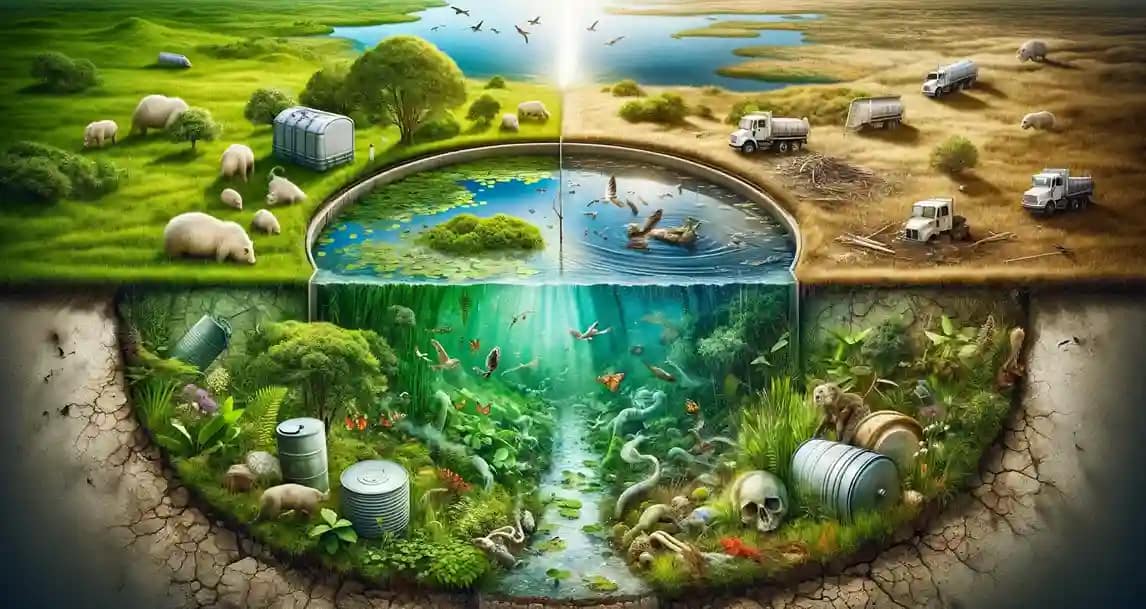Is Septic Tanks Bad for the Environment is a question asked by all those who want to have a septic tank and those who are sensitive to the environment. To fully answer this, we need to know whether the person using the septic tank is using it within the rules. So if you are going to have a septic tank, you will minimize the potential damage if you use it in accordance with nature and rules.
Septic tanks are a common wastewater treatment system for homes and businesses that are not connected to a municipal sewer system. Septic tanks collect and treat wastewater from toilets, sinks, and other plumbing fixtures. However, there is some debate about whether or not septic tanks are bad for the environment.
Potential Environmental Impacts of Septic Tanks
As mentioned above, it is up to you to minimize these effects. You must comply with the laws in your state and nature conservation laws. There are a number of potential environmental impacts of septic tanks, including.
Groundwater Contamination
If a septic tank is not properly maintained, it can leak wastewater into the groundwater. This can contaminate the groundwater with harmful bacteria and nutrients, which can pose a health risk to humans and wildlife.
Surface Water Contamination
Septic waste can pollute surface waters such as lakes, seas or rivers. This can cause various problems. For example, algae blooms can occur. Not only that, it can cause other water quality problems. For this reason, it should be used with caution and with the awareness that we are responsible for nature.

Nutrient Pollution
Septic tanks can contribute to nutrient pollution, which is a major environmental problem. Nutrients from septic tanks can enter waterways and cause algal blooms, which can lead to fish kills and other problems.
Soil Contamination
Another problem that wastewater can cause is soil pollution. If septic tanks are not used correctly, they can also contaminate the surrounding soil. This can lead to many other problems, especially the growth of harmful bacteria.
What are the Benefits of Using a Septic Tank?
We have listed the potential environmental impacts for you. So now we know you have this question in your mind. What are the benefits of a septic tank? You should thoroughly examine the benefits and harms and make your decision. Let’s see what the benefits are, including the following.
Decentralized Wastewater Treatment
Septic tanks provide a decentralized wastewater treatment system, which can help to reduce the burden on municipal sewer systems. So if you are in a compulsory situation, it can be a savior in a way.
Cost-Effective
Septic tanks are relatively cost-effective to install and maintain. While they are generally cheaper, modern and more advanced tanks can cost a little more. When buying a septic tank, it is important to choose the right product along with your budget. You should not use bad products just because they are cheap. This can lead to more problems.
Reliable
Septic tanks are a reliable wastewater treatment system that can operate even in areas without electricity or other infrastructure.
How to Minimize the Environmental Impact of Septic Tanks
There are a number of things that homeowners can do to minimize the environmental impact of their septic tanks.

- Regular Maintenance: Septic tanks should be pumped and inspected regularly to ensure that they are functioning properly.
- Proper Siting: Septic tanks should be sited in a location that is away from water sources and in soil that is suitable for septic tank drainage.
- Use Water-Efficient Fixtures and Appliances: Using water-efficient fixtures and appliances can help to reduce the amount of wastewater that is generated and sent to the septic tank.
- Avoid Putting Harmful Substances Down the Drain: Harmful substances, such as grease, fats, and chemicals, can damage the septic tank and pollute the environment.
Septic tanks can have both positive and negative environmental impacts. However, by properly maintaining septic tanks and taking steps to minimize their environmental impact, homeowners can help to protect the environment and ensure that septic tanks continue to be a viable wastewater treatment option.
- Septic tanks are typically made of concrete, fiberglass, or plastic.
- The lifespan of a septic tank is typically 20 to 30 years.
- Septic tanks should be inspected every few years to ensure that they are functioning properly.
